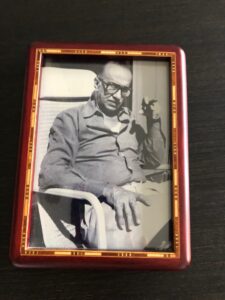My mother used to say in jest that my father was “feo” or “feísimo” (ugly or very ugly); compared to her and her siblings, who were so striking, I guess it was true. I had forgotten about this until I read her letters to him during the Spanish Civil War, where she would often address him that way (see My Mother That Stranger. Letters from the Spanish Civil War). Eventually my dad tired of this, he didn’t think it was funny and she must have reconsidered. At least she must have admitted that he had beautiful hands.
As children my brother and I marveled at all the things my father could do. His hands were large and sturdy with long fingers, smooth knuckles, bulging veins and perfectly-kept nails. His hands were strong enough to play jai alai, a game similar to racquet ball, with his bare hands and gentle enough to peel an apple or an orange all in one long piece without tearing the skin. He could cut a melon, holding it in one hand, without dropping a single slice. We thought he was magical!
Having spent summers with his family in the countryside—Valencia is known as the orchard of Spain—, my dad could always choose the best melons. In some small fruit markets, the merchants would cut a small piece of the melon in season, allowing the customers to taste it before taking it home. This was called “calar el melón” (sort of plunging the melon). When we moved to Madrid, they didn’t allow such a farmer’s trick in the supermarkets and my mother could never pick a good enough melon, a honeydew for example, to please my dad. He would often say that she had purchased a big cucumber instead!
 In this photograph my dad has a typical expression: staring intensely, without smiling. He thought it was silly to smile in pictures, he was as serious man. The sun is making him squint his eyes. His hair is thinning, but it’s still dark as is his mustache. He is dressed casually like he preferred to do, the undershirt showing a bit. His left hand is holding a cigar; it must have been after his mid-day meal, his favorite time to smoke. He never stopped smoking, despite having been diagnosed with emphysema and, surprisingly, he lived to be almost 96 years old.
In this photograph my dad has a typical expression: staring intensely, without smiling. He thought it was silly to smile in pictures, he was as serious man. The sun is making him squint his eyes. His hair is thinning, but it’s still dark as is his mustache. He is dressed casually like he preferred to do, the undershirt showing a bit. His left hand is holding a cigar; it must have been after his mid-day meal, his favorite time to smoke. He never stopped smoking, despite having been diagnosed with emphysema and, surprisingly, he lived to be almost 96 years old.
He is wearing a wedding band on his right hand, but not in the traditional finger. I can’t fathom why. I don’t recognize the chair or the place either and I deduce that this photo must have been taken after my mother died and Muriel, his young, new wife, probably took this picture; she is a good photographer. Wedding bands are worn on the right hand in Spain, but my mother would have insisted on wearing it in the correct finger.
My father’s perfect photo would not show him smiling or dressed up, nor would it be in front of his many diplomas and honors but he could have been holding his ink pen. After all, he wrote his monumental history of Spanish literature in six volumes (Historia de la literatura española, Vols. I-VI) plus other books on history and literary theory longhand.
